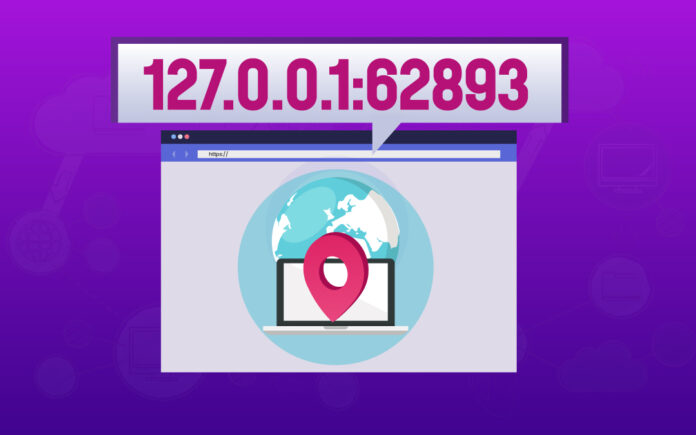127.0.0.1:62893 might look like a bunch of random numbers, but it’s actually very useful for your computer. It’s a way for your computer to talk to itself! This special IP address, 127.0.0.1, is called the localhost and the number 62893 is a port that lets programs communicate.
When you use 127.0.0.1:62893, you are creating a small, private network on your computer. This is helpful for testing new programs or websites before they go live on the internet. Developers use this setup to make sure everything works smoothly without involving the whole world just yet.
What is 127.0.0.1:62893?
127.0.0.1:62893 is a combination of an IP address and a port number. Here’s what each part means:
- 127.0.0.1: This is known as the “localhost” or loopback address. It’s a special IP address that points to your own computer.
- 62893: This is a port number. A port acts like a door on your computer where information can enter and leave.
Together, 127.0.0.1:62893 helps your computer send messages back to itself. This is useful for testing programs and websites before they go live on the internet.
How Does 127.0.0.1:62893 Work?
Let’s break it down even more:
- 127.0.0.1: This address is like your computer’s own name. When you use it, you are telling your computer to talk to itself.
- Port 62893: Ports are like channels for communication. The number 62893 is one of many ports that your computer can use.
When developers use 127.0.0.1:62893, they are creating a tiny, private network within their own computer. This allows them to run tests without using the internet or involving other devices.
Why Do Developers Use 127.0.0.1:62893?
Developers use 127.0.0.1:62893 for many reasons:
- Testing Software: Before putting a program or website online, it’s smart to test it. 127.0.0.1:62893 lets developers do this on their own computers.
- Private Network: It creates a private space where the computer only talks to itself, making it easier to catch any mistakes.
- Faster Response Times: Since everything happens on the same computer, the connection is very fast. There’s no waiting for the internet to respond.
- No Internet Needed: You don’t need an internet connection to use 127.0.0.1:62893. The computer communicates internally, making it a safe and easy way to test things.
Benefits of Using 127.0.0.1:62893
Using 127.0.0.1:62893 has several benefits:
- Security: Since you are not connected to the internet, there’s less chance of hacking or interference.
- Control: Developers have complete control over what happens during the testing process.
- Efficiency: It’s faster to run tests locally, and problems can be fixed quickly without involving other servers.
How to Use 127.0.0.1:62893 for Testing
Here’s how to use 127.0.0.1:62893 for testing purposes:
- Set up a local server: Many developers use software like Apache to create a local server.
- Access the localhost: Open a browser and type 127.0.0.1:62893 into the address bar.
- Run tests: You can now test your program or website as if it’s live on the internet, but everything stays on your computer.
Pro Tip: If something isn’t working, try restarting your local server or checking your firewall settings.
Common Errors with 127.0.0.1:62893
While 127.0.0.1:62893 is usually easy to use, some errors can occur:
- Server not running: If you can’t connect to 127.0.0.1:62893, check if your server is running.
- Port conflicts: If another program is using port 62893, you may need to choose a different port.
- Firewall issues: Sometimes, your computer’s firewall may block the connection. You might need to adjust the settings.
How to Find Your Local IP Address
If you want to find your computer’s local IP address, here’s what you do:
- Windows: Open the command prompt (type CMD in the search bar) and type ipconfig. Look for “IPv4 Address” to see your local IP.
- Mac/Linux: Open the terminal and type ifconfig. Look for “inet” to find your local IP.
Once you have your IP address, you can access your localhost and start testing!
The Difference Between 127.0.0.1:62893 and Other IP Addresses
Not all IP addresses are the same. Here’s how 127.0.0.1:62893 differs from others:
- Public IPs: These are the addresses used to connect to the internet. For example, a website might have an IP like 192.168.1.1.
- Private IPs: These are used within your own home or office network.
- 127.0.0.1: This address is always reserved for localhost, meaning it only points to your own computer.
Advantages of Using 127.0.0.1:6289,3
There are many advantages to using 127.0.0.1:6289,3:
- Safe Testing Environment: You can experiment with new software or features without risking damage to your real data or online servers.
- Speed: Testing on your local machine is much faster than using remote servers.
- Accessibility: You can work on your project anytime, even without internet access.
How to Solve Problems with 127.0.0.1:6289,3
If you encounter issues when using 127.0.0.1:6289,3, here are some quick fixes:
- Restart your server: Sometimes a simple restart can fix problems.
- Check port usage: If port 62893 is busy, you can use a different port number.
- Adjust firewall settings: If your computer’s firewall is blocking the connection, you can allow access to 127.0.0.1 in the settings.
Conclusion
127.0.0.1:6289,3 is a powerful tool for developers and anyone interested in testing software or websites. It allows for fast, secure, and efficient testing directly on your own computer without needing an internet connection. Whether you’re a beginner or an experienced developer, knowing how to use 127.0.0.1:6289,3 can make your development process smoother and more secure. It’s a simple yet essential part of modern computing!




